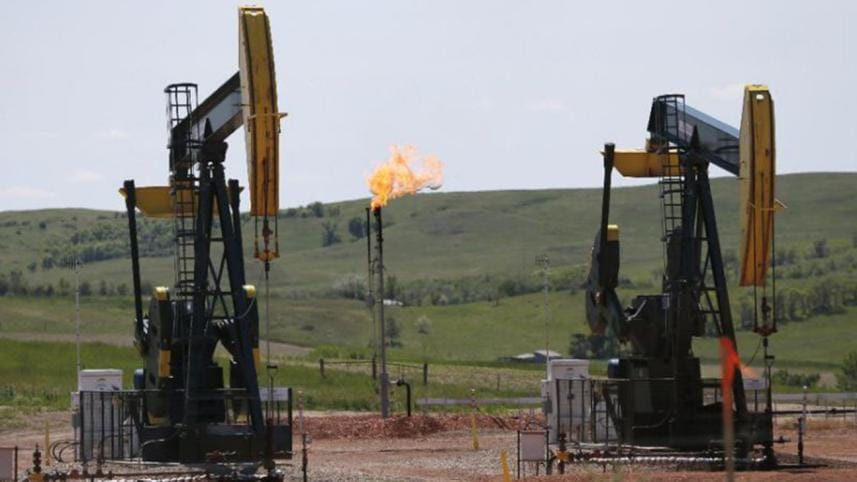US proposes to cut methane from oil, gas by nearly half

The Obama administration issued a final rule Thursday to sharply cut methane emissions from US oil and gas production, a key part of a push by President Barack Obama to reduce methane emissions by nearly half over the next decade.
The rule by the Environmental Protection Agency is the major element of an administration goal to reduce methane emissions from oil and gas drilling by up to 45 percent by 2025, compared to 2012 levels. It will require energy producers to find and repair leaks at new or modified oil and gas wells and capture gas that escapes from wells that use the common drilling technique known as hydraulic fracturing, or fracking.
Methane, the key component of natural gas, tends to leak during oil and gas production. Although it makes up just a sliver of greenhouse gas emissions in the United States, it is far more powerful than carbon dioxide at trapping heat in the atmosphere, making it a top target for environmentalists concerned about global warming.
Officials estimate the rule will cost the industry about $530 million in 2025. Those costs would be outweighed by reduced health care costs and other benefits totaling about $690 million, officials estimate.
EPA administrator Gina McCarthy said the new rule would "protect public health and reduce pollution linked to cancer and other serious health effects while allowing industry to continue to grow and provide a vital source of energy for Americans across the country."
The mandate, which will take effect this summer, will apply only to new and modified sources, such as wells, pumps, pipes and compressors, but it will set a framework for the EPA to impose similar requirements on nearly 1 million existing wells and other equipment nationwide. Those rules are not expected before Obama leaves office.
With his presidency drawing to a close, Obama has been in a rush to propose and finalize sweeping regulations targeting greenhouse gases blamed for global warming.
The methane rule follows a landmark regulation Obama finalized last year to cut carbon dioxide emissions from coal-fired power plants by 32 percent. The plan, the centerpiece of Obama's climate change strategy, has drawn legal challenges from power companies and dozens of Republican-led states.
Obama also has proposed regulations targeting carbon pollution from airplanes and set new standards to improve fuel efficiency and reduce carbon dioxide pollution from trucks and vans.
In January, the administration proposed new rules to clamp down on oil companies that burn off or "flare" natural gas on public lands, saying it will reduce waste and harmful methane emissions. Between 2009 and 2014, enough natural gas was lost through venting, flaring and leaks to power more than 5 million homes for a year, officials said.
The president has set a goal to cut overall US emissions by 26 percent to 28 percent over the next decade, as he seeks to leave a legacy of using the full range of his executive power to fight climate change and encouraging other countries to do the same.
Fred Krupp, president of the Environmental Defense Fund, an advocacy group, called methane "a tremendous threat to our climate" and said cutting methane pollution "is the fastest, cheapest path to slow the warming we will otherwise see in the next 20 years."
The American Petroleum Institute, the largest lobbying group for the oil and gas industry, said the new rule could harm a drilling boom that has lowered costs for American consumers to heat their homes and drive their cars. Fracking and other advanced drilling techniques have made it easier for energy companies to extract oil and gas from hard-to-reach sites.
Even as oil and natural gas production has risen dramatically, methane emissions have fallen, thanks to new technologies that have reduced waste and improved efficiency, industry officials said.
"It doesn't make sense that the administration would add unreasonable and overly burdensome regulations when the industry is already leading the way in reducing emissions," said Kyle Isakower, API vice president of regulatory and economic policy.
Rachel Richardson, director of the Stop Drilling program for Environment America, another advocacy group, called the new rule a step forward, but said it "falls short of what's needed to avert climate disaster."
Richardson and other advocates said better controls on existing fracking and drilling operations are needed, along with a commitment to phase out fossil fuels such as oil, gas and coal in favor of renewable energy such as wind and solar power.
The EPA said Thursday it is also asking energy companies to provide a range of information on existing drilling wells, including the types of technologies that could be used to reduce methane emissions. EPA will collect the information for the next year, with the intent of issuing a rule sometime next year.



 For all latest news, follow The Daily Star's Google News channel.
For all latest news, follow The Daily Star's Google News channel.
Comments